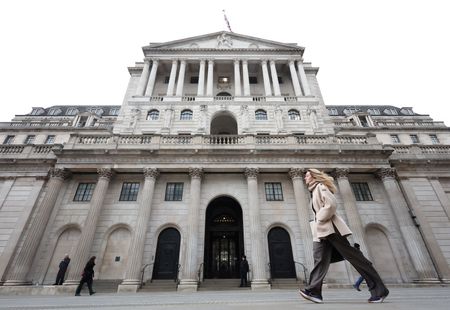By David Milliken
LONDON (Reuters) – Britain is set for solid growth and falling inflation this year but the Bank of England has little scope to cut interest rates further, the NIESR think tank predicted on Wednesday in a relatively upbeat set of forecasts.
The National Institute of Economic and Social Research also said finance minister Rachel Reeves remained just on track to stay within her fiscal rules when the Office for Budget Responsibility updates its forecasts next month – though it said there should be a greater focus on long-term debt challenges.
NIESR forecast the British economy would grow by 1.5% this year – double a Bank of England forecast last week and above the 1.3% average in last month’s Reuters poll of economists – followed by the same growth rate in 2025.
“Although consumer and business confidence fell at the back end of last year leading to a flattening of GDP, we expect 2025 to be better as the large increase in government spending announced in the October budget kicks in,” said Stephen Millard, NIESR’s interim director.
Asked to explain the difference with the BoE forecast, NIESR economist Benjamin Caswell said the think tank had placed less weight on global trade uncertainty, poor business sentiment and weak growth at the end of 2024 among other factors.
NIESR also predicted a much more benign path for inflation than the BoE, which forecast inflation would pick up to 3.7% in the third quarter of this year and not return to its 2% target until late 2027.
Instead, NIESR foresees less impact from higher energy prices and expects inflation reached a peak of 3.2% in January and would average 2.4% this year and 2% in 2026.
Despite this, NIESR says BoE only has scope to cut rates by a further quarter point this year and once more in 2026, lowering them to 4% – the rate at which it sees monetary policy as neither adding to nor subtracting from inflation.
Last week the BoE said a survey of investors showed they saw the long-term neutral interest rate in a 3-3.5% range.
Greater trade and financial fragmentation and growing pressure on governments to borrow to finance the green transition and ageing populations were pushing up on this neutral rate, NIESR said.
(Reporting by David Milliken, editing by Andy Bruce)










